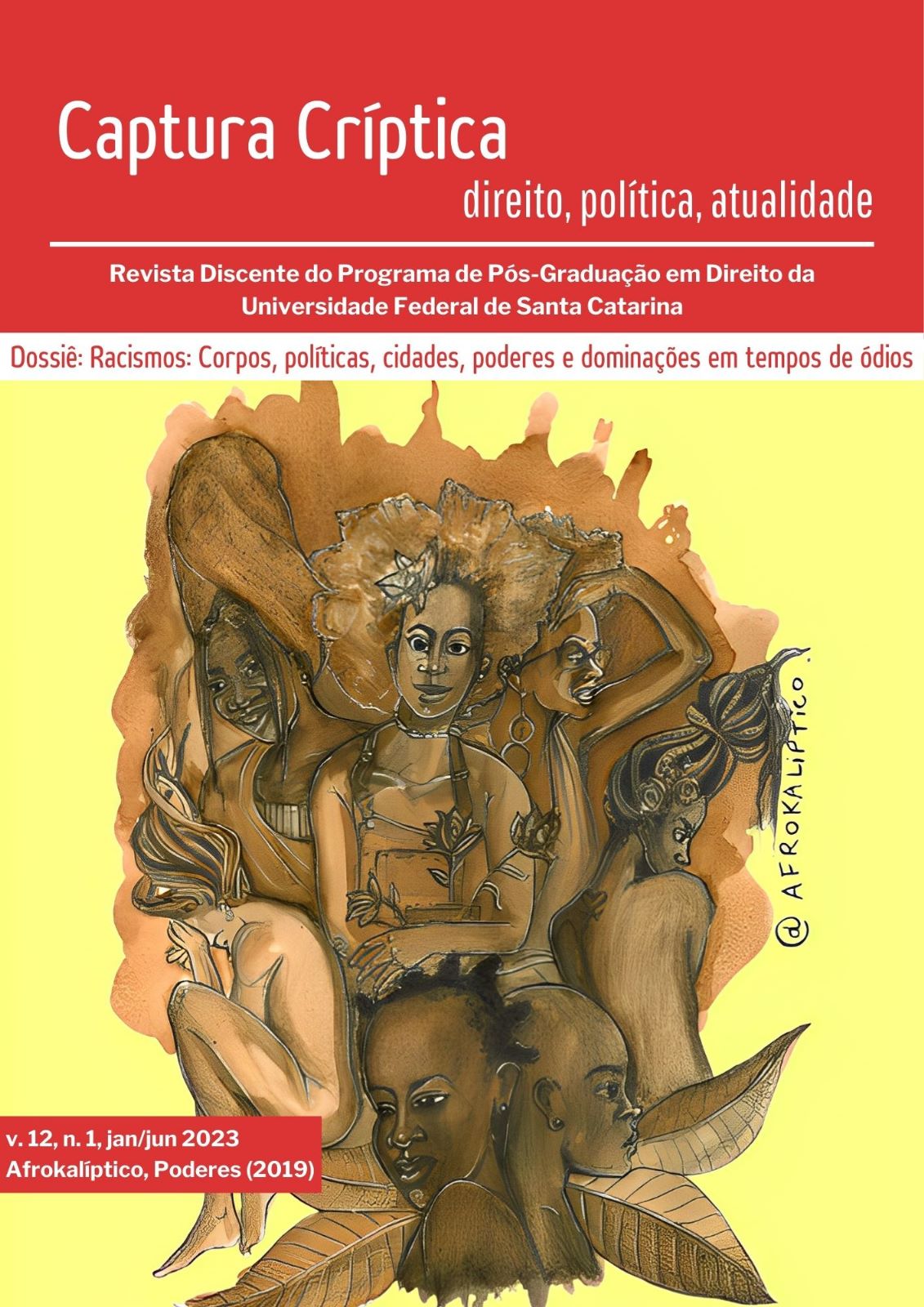Povos e Comunidades Tradicionais de Matriz Africana: outras epistemologias e filosofias garantidoras da continuidade ontológica afro-brasileira
Palavras-chave:
Povos e comunidades tradicionais/matriz africana, Epistemologias, Filosofias, Continuidade ontológicaResumo
O presente artigo analisa o conceito de Povos e Comunidades Tradicionais de Matriz Africana, dissecando a epistemologia e filosofia garantidoras da continuidade ontológica do povo descendente de africanos no Brasil. Desta forma, busca introduzir os mecanismos jurídicos de proteção dos povos e comunidades tradicionais problematizando a real efetividade desses mecanismos como garantidores de justiça social tendo em conta a ‘Política de Inimizade” enraizada no Estado brasileiro para com os descendentes de africanos deste território. Para isso se discutirá, a partir de uma abordagem qualitativa ancorada em uma revisão de literatura, conceitos-chave trazidos por Mbembe (2017) em seu livro “Políticas da inimizade “, assim como problematizar a constituição do Estado democrático de direito e do sujeito individualista produto da pós-modernidade, ou como alguns autores determinam “modernidade tardia” a partir da pilhagem dos povos ditos não civilizados. Pensar como essa pilhagem afeta diretamente a possibilidade de manutenção da humanidade tendo em vista a conquista e potencial destruição do cosmos como basilar do modelo de sociedade pós-moderna branco-ocidental. Assim, este estudo pretende potencializar as epistemologias e filosofias originárias, contribuindo para outras leituras e percepções a cerca do processo civilizatório ocidental.
Referências
BRASIL. Decreto nº 6.040, de 7 de fevereiro de 2007. Institui a Política Nacional de Desenvolvimento Sustentável dos Povos e Comunidades Tradicionais. Diário Oficial da União, Brasília, 08 fev. 2007a <https://www.planalto.gov.br/ccivil_03/_ato2007- 2010/2007/decreto/d6040.htm> (Último acesso realizado em 20 de abril de 2023)
BRASIL. Secretaria de Políticas de Promoção da Igualdade Racial. Plano nacional de desenvolvimento sustentável dos povos e comunidades tradicionais de matriz africana. Brasília: Seppir, 2013 <http://www.seppir.gov.br/portal-antigo/arquivos-pdf/planonacional- de-desenvolvimento-sustentavel-dos-povos-e-comunidades-tradicionais-dematriz- africana.pdf/view> (Último acesso realizado em 20 de abril de 2023).
GÓES, Lúcino. A “Tradução” de Lombroso na Obra de Nina Rodrigues: o racismo como base estruturante da criminologia brasileira. Santa Catarina: Editora Revan, 2017.
ILO. Indigenous and tribal peoples convention (Convention 169). Geneva: ILO. Publicada em 27 de junho de 1989.
LÉVI-STRAUSS, Claude. Tristes Tropiques. Nova York: Penquin, 1992
MBEMBE, Achille. Crítica da razão negra. Tradução de Marta Lança. Lisboa: Antígona, 2014.
MBEMBE, Achille. Políticas da inimizade. Tradução de Marta Lança. Lisboa: Antígona, 2017.
NASCIMENTO, Abdias do. O quilombismo: documentos de uma militância panafricanista. Petrópolis: Vozes, 1980.
OYĚWÙMÍ, Oyèrónké. Visualizing the Body: Western Theories and African Subjects in: COETZEE, Peter H.; ROUX, Abraham P.J. (eds). The African Philosophy Reader. New York: Routledge, 2002, p. 391-415. Tradução para uso didático de Wanderson Flor do Nascimento.
SANTOS, Boaventura de Sousa; MENESES, Maria Paula. (Orgs.) Epistemologias do Sul. São Paulo; Editora Cortez. 2010.
SODRÉ, Muniz. Pensar nagô. Petrópolis: Vozes, 2017.
UN. Durban declaration and programme of action. Durban: UN. Publicada em 8 de setembro de 2001.
UNESCO. Universal declaration on cultural diversity. Paris: UNESCO. Publicada em 2 de novembro de 2001.
YOUNG, Jock. A sociedade excludente. Tradução de Renato Aguiar. Rio de Janeiro: Revan, 2002.
Downloads
Publicado
Edição
Seção
Licença
Copyright (c) 2023 Renato Duro Dias, Murilo Trindade e Silva

Este trabalho está licenciado sob uma licença Creative Commons Attribution-NonCommercial-NoDerivatives 4.0 International License.
Os trabalhos publicados na Revista Captura Críptica estão sob a Licença Creative Commons Attribution-NonCommercial-NoDerivatives 4.0 International.










